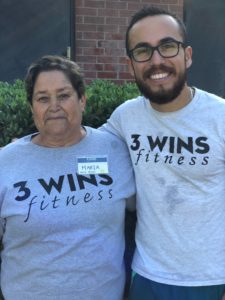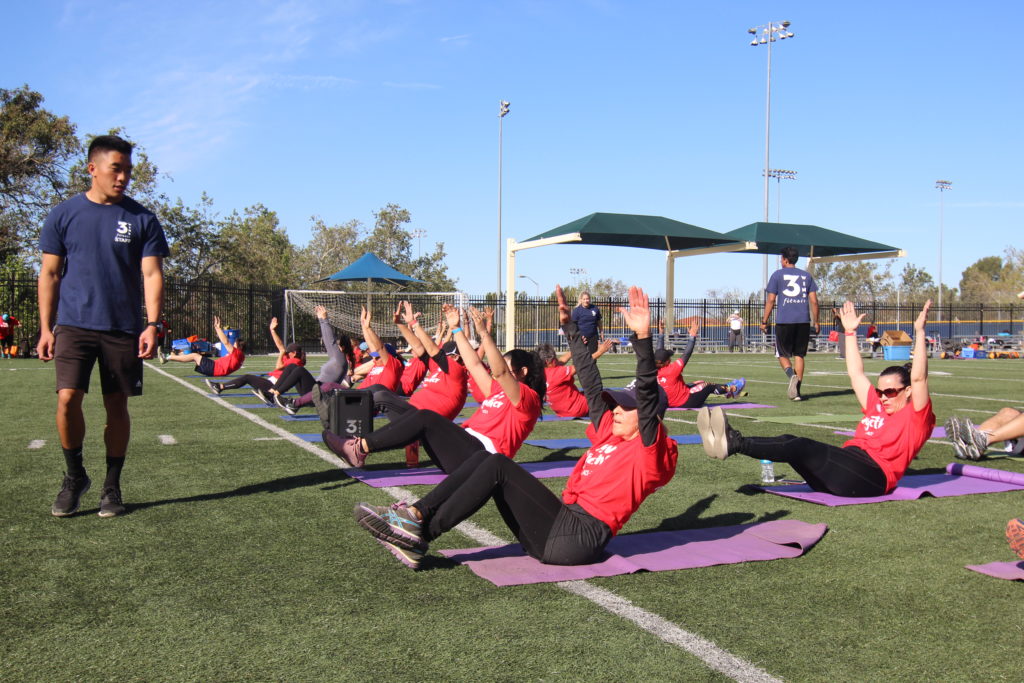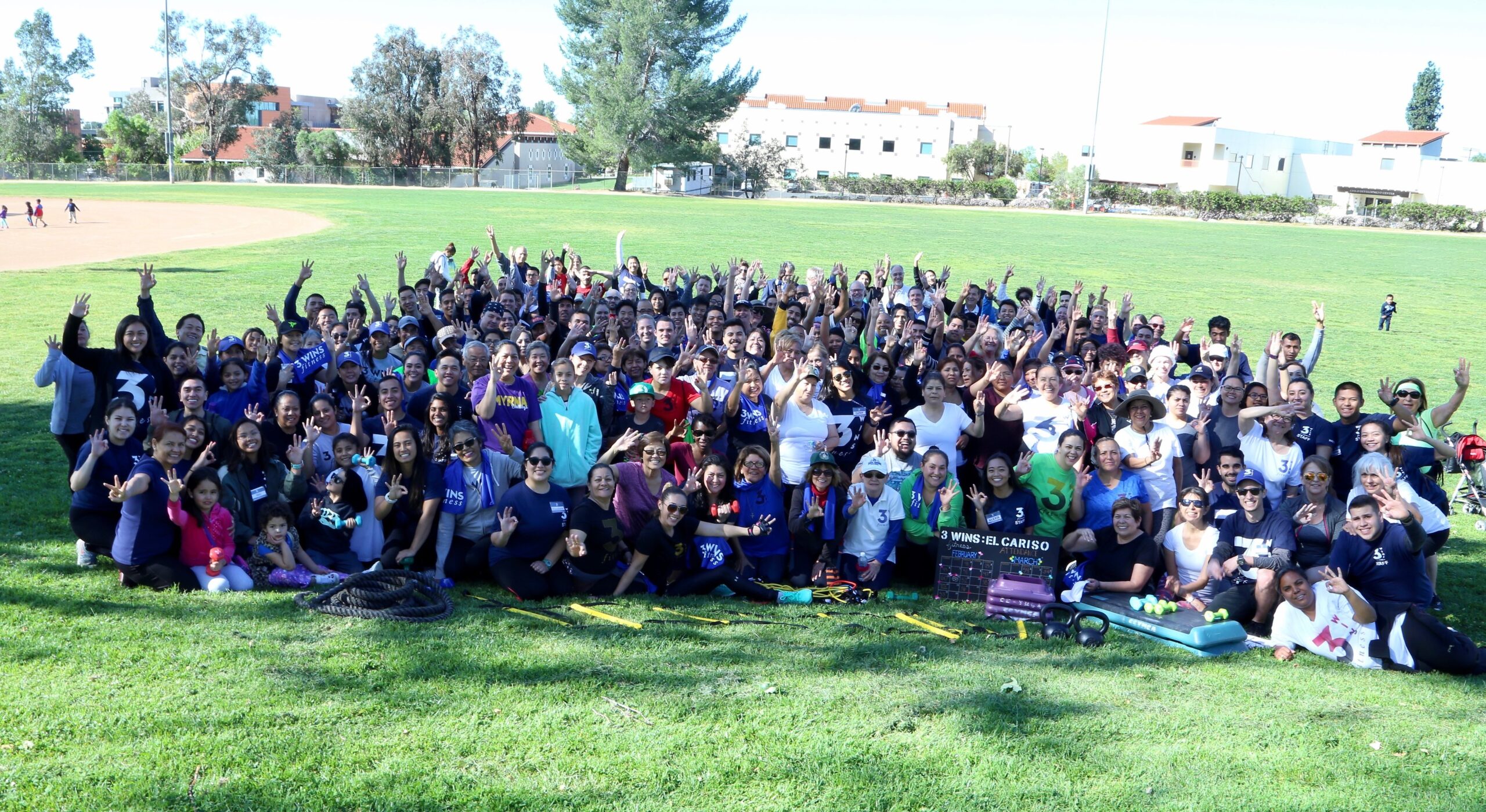Issue Category: School Nutrition
3 WINS Fitness: Free Exercise Classes get Communities Moving
Regular physical activity promotes good health and well-being. Yet, about 80 percent of American adults do not meet the minimum recommended levels for cardiovascular activity and strength training needed to support optimal health and prevent the risk of chronic diseases.
3 WINS Fitness seeks to improve community health by increasing people’s physical activity levels. Launched in 2011 as 100 Citizens by California State University, Northridge’s (CSUN) Department of Kinesiology in partnership with Recreation Park in San Fernando, CA, 3 WINS Fitness offers a tailored and comprehensive free exercise intervention that is sustainable and replicable through its delivery by university kinesiology students. Programs are provided at public parks, faith-based institutions, and public schools, and currently they operate at six sites across Los Angeles County serving over 300 participants.
In 2013 the White House recognized and gave an award to the program through First Lady Michelle Obama’s “Let’s Move!” campaign. Since then, the program has scaled to three other universities within the California State University system.
Their program’s “3 WINS” reflects their social impact priorities: community health, participant fitness, and student professional development.
WIN 1: Community Health
Access and affordability to safe places to engage in physical activity promotes optimal community health. However, many low-income communities do not have affordable access to safe places for physical activity, and thus have a disproportionate burden of disease compared to wealthier communities.
Steven Loy, Ph.D., professor of kinesiology at CSUN and founder/faculty advisor for 3 WINS Fitness says the program focuses on those underserved communities which are at high risk for diabetes, cardiovascular disease, obesity and other chronic diseases related to physical inactivity.
“Having a program in their neighborhood park, school, and church where they can easily walk to and exercise, especially where there are no other physical activity programs is important,” said Loy. “We are holding it in communities that county public health has identified as areas where health inequities exist, and we are helping to address the social determinants of health by improving the physical activity conditions of those communities.”
Loy says through their research with RAND Corporation and the data they have collected, they observed a greater use of park facilities with the introduction of structured physical activity, in particular for the senior population reflecting a sense of safety and community among themselves and their students.
WIN 2: Participant Health

3 WINS Fitness provides participants with a dynamic 60-minute exercise routine three times per week for adults of all ages and fitness abilities, including a falls prevention group, and free diabetes prevention program modified from the National Diabetes Prevention Program.
Loy noted, “participants who attend the three classes per week exceed the minimum recommended levels for cardiovascular activity and strength training cited in the 2018 Physical Activity Guidelines. Throughout the years, our 3 WINS Fitness participants have had many success stories.”
“Doctors said I would need surgery for a back injury, I was in constant pain, I couldn’t even lift my arms to brush my hair” said 3 WINS participant of two years Balvina Nuño. “Since joining 3 WINS, the injury has healed without surgery. I can now lift my arms over my head, and I have lost 30 pounds! I am thankful to God and the instructors for giving me my life back.”
Other participants of the program have also reported improved health.
“I started 3 WINS Fitness last summer and have lost over 40 pounds,” said Andrea Veronica. “I am diabetic and was required to inject insulin 6 times a day. Because of this program, today I am no longer required to inject myself or take any medication. I am happy and feel more energetic than ever!”
“I started this program in October 2017 as a pre-diabetic,” added Candy Lopez. “I have lost 24 pounds, and I feel happier and have more energy. I love coming here because the participants and instructors create such a strong family-like community that I feel motivated to come workout every time.”
WIN 3: Student Professional Development
The kinesiology students involved in the program include both undergraduate and graduate students trained and educated in exercise and human movement. For them, 3 WINS Fitness is an opportunity to apply their education, gain job-related experience, and grow in leadership skills and self-empowerment.
“Noting the constant changes happening in health care reform, I realized what we are doing through 3 WINS Fitness is so special and is soon, if not already, to become the face of preventative health care methods that is efficient, cost-effective, and helps not only me as a healthcare provider, but most importantly, the individuals in the communities around us attain their best level of health and fitness,” said Angelica Alberto, a former 3 WINS Fitness student volunteer who is now pursuing a Doctor of Physical Therapy and Master of Public Health dual degree at Northwestern University.
Loy says it is also an opportunity to show communities what those educated in kinesiology can do for public health.
“We have found that there are few opportunities created for kinesiology and public health to work together. We are trying to change that with upstream solutions to the ideas promoted by Public Health 3.0,” said Loy. “We have recruited students to create an ongoing army of individuals trained in physical activity who are pursuing additional public health education opportunities, and, are motivated and enthusiastic to deliver programming that reaches the whole community to improve health.”
Where is the Program Going?

3 WINS Fitness participants receive exercise programming from 3 WINS Fitness kinesiology students during a 3 WINS
Fitness Summit held in April 2018.
Throughout 3 WINS Fitness’ journey, partnerships have been critical. The program has teamed with public and private sector partnerships with parks and recreation, public health, universities and research institutions, hospitals, and health and fitness organizations to sustain, scale, and provide accessible physical activity programming to communities.
One of those partners is the American Council on Exercise (ACE). Cedric Bryant, Ph.D., ACE President and Chief Science Officer says “ACE’s partnership with 3 WINS Fitness helps us fulfill our mission to get people moving, regardless of age, gender, race, or socioeconomic background.”
In the spring of 2018, ACE partnered with 3 WIN Fitness to hold a Summit to demonstrate the program to stakeholders. One of the attendees included Loretta DiPietro, Ph.D., professor of exercise and nutrition sciences at the Milken Institute School of Public Health at George Washington University in Washington, D.C. She was also a committee member of the 2018 Physical Activity Guidelines Advisory Committee which reviewed the scientific evidence and prepared a report about physical activity and health for the second edition of the Physical Activity Guidelines for Americans.
She said, “I’ve been waiting my entire public health career to see the science of exercise and physical activity translated and scaled up to the community level so elegantly and effectively. The cultural wave of change in how communities adopt an active lifestyle begins now with 3WINS Fitness!”
According to a study done by the Centers for Disease Control and Prevention, 11.1 percent in total health care expenditures were associated with inadequate levels of physical activity. However, if programs were in place to help adults meet current guidelines for physical activity, the country could avert up to an estimated $117 billion in preventable health care spending.
Loy said 3 WINS Fitness is part of that solution, and their next goal is to scale 3 WINS Fitness through universities across the country by training staff to develop and sustain their own program specific to their community.
“There are over 700 universities with kinesiology programs,” said Loy. “Our experience in replicating our program, as well as scaling it to other universities has identified the challenges existing for collaboration among public health, kinesiology, parks and recreation, and faith-based organizations, but it has also been an 8-year demonstration that an affordable sustainable solution is possible if we work together. The university kinesiology model can drive community wide disease prevention programs which can be customized for the needs of the community.”
*3 WINS Fitness Banner Photo Credit: Carmen Anthony
Promoting Health and Cost Control in States
States Can Improve Residents’ Health and Reduce Healthcare Spending by Adopting Policies Outside of the Healthcare Sector, New Report Shows
February 21, 2019
Policies that can improve health and save money include: Pre-K and school nutrition programs, syringe access, tobacco and alcohol taxes, paid family leave, the Earned Income Tax Credit and rapid rehousing.
(Washington, DC) — States can improve their residents’ health and well-being, and lower healthcare costs, by implementing a range of policies in sectors beyond healthcare, according to a new report, Promoting Health and Cost Control: How States Can Improve Community Health and Well-being through Policy Change, released today by Trust for America’s Health (TFAH).
The new report analyzes state action on 13 policies outside the healthcare sector that have a long-term impact on health and an evidence base showing their effectiveness. They include: tobacco and alcohol taxes, syringe access programs, universal pre-K and rapid rehousing laws, among others. The wide policy lens of the report, which covers numerous sectors, including taxation, employment, education, housing and transportation, underscores the many economic and social factors beyond medical care that influence health.
In the context of the longest decline in life expectancy since World War I, and, insufficient resources dedicated to preventing health problems before they arise, this new report serves as an urgent call to state policymakers to take concrete steps to improve residents’ health. The report was made possible by financial support from the Robert Wood Johnson Foundation and Kaiser Permanente.
“In the current environment, states have an even more vital role to play in promoting the health and well-being of their residents,” said John Auerbach, President and CEO of Trust for America’s Health. “Our goal in creating this report is to provide state public health officials and policymakers the evidence and business case for the adoption of policies that have been shown to improve community health.”
| Policies Analyzed in the Report | Number of States with the Policy |
| Universal Pre-K program* | 10 (incl. DC) |
| School breakfast program | 31 (incl. DC) |
| School lunch program | 20 |
| School competitive foods (snacks and drinks) | 28 (incl. DC) |
| Syringe access programs | 27 (incl. DC) |
| Smoke-free laws** | 29 (incl. DC) |
| Tobacco taxes*** | 51 (incl. DC) |
| Alcohol taxes*** | 51 (incl. DC) |
| Complete streets | 30 (incl. DC) |
| Housing rehabilitation loan and grant programs**** | 40 (incl. DC) |
| Rapid re-housing laws | 9 (incl. DC) |
| Earned income tax credit | 30 (incl. DC) |
| Paid sick leave | 12 (incl. DC) |
| Paid family leave | 7 (incl. DC) |
| Fair hiring protections (ban the box) | 34 (incl. DC) |
The economic benefits of these policies can be substantial. For example:
- Pre-K education programs can generate $4.63 in benefits to participants, taxpayers, and others in society for every $1 spent on such programs.
- Expanding syringe exchange programs could return $7.58 for every $1 invested in the long run, by lowering HIV rates and reducing treatment costs. There is no evidence such programs lead to higher drug use.
- Rapid re-housing programs, which focus on getting homeless individuals into stable housing before addressing other challenges, can reduce hospital admissions and jail bookings. One pilot study found that such an approach saved more than $36,000 in treatment costs per person over the course of a year, nearly twice what the program cost.
“While the healthcare sector plays an important role in providing health services when someone gets sick, many of the factors that keep people healthy are outside the healthcare system and involve where people live, work, play and learn,” said Adam Lustig, Manager of the Promoting Health and Cost Control in States initiative and one of the report authors. “This report gives state policymakers a menu of evidence-based policies that have been shown to improve individual and community health.”
“I encourage all state policymakers to read this important report. Doing so will give them access to proven solutions to the challenge of run-away healthcare spending yet so little improvement in health outcomes. To improve Americans’ health, we have to think beyond the healthcare sector and about the many factors that impact health,” said Anand Parekh, MD, MPH, Chief Medical Advisor, Bipartisan Policy Center and a member of the Promoting Health and Cost Control in States Advisory Board.
To create the report, TFAH reviewed approximately 1,500 evidence-based programs and strategies. The 13 policies ultimately included in the report all:
- Have a strong health impact and economic evidence of that impact, such as cost avoidance or reduction.
- Focus on prevention at the population health level, i.e., are designed to prevent illness or injury at the community level rather than the individual level.
- Focus on primary prevention, preventing an injury or illness rather than treating it.
- Can be implemented by state legislative action.
The findings show dramatic variability in how states approach these health-promoting policies. For instance, all 50 states plus DC institute tobacco and alcohol taxes. But only nine states and DC have laws in place to encourage universal pre-K programs, which have been shown to set children up for better health later in life. Universal pre-K programs are state funded programs that support pre-K for nearly 50 percent or more of the state’s 4-year-olds. Only six states and DC support paid family leave, even though data show such policies support maternal and child health, and, can save employers money in the long run.
“Action is imperative,” said Auerbach. “As a nation, we spend trillions of dollars a year on healthcare and yet Americans are getting less healthy. The solution is two-fold: direct more spending to prevention efforts and address the social determinants of health instead of their impact after someone is sick.”
Notes:
*states that support state-funded pre-K to nearly 50% or more of the state’s 4-year-olds.
**comprehensive smoke-free as per the American Lung Association
*** rates vary, and higher taxes are generally more effective
**** many states fund such programs in the absence of statewide legislation
# # #
Trust for America’s Health is a nonprofit, nonpartisan organization that promotes optimal health for every person and community and makes the prevention of illness and injury a national priority. www.tfah.org


